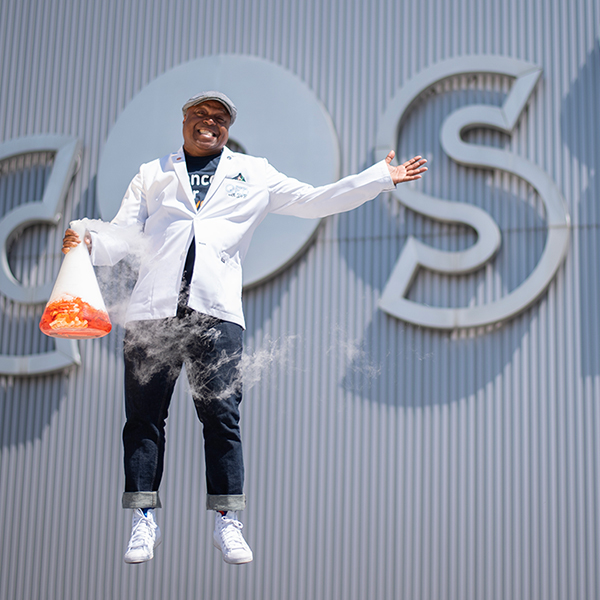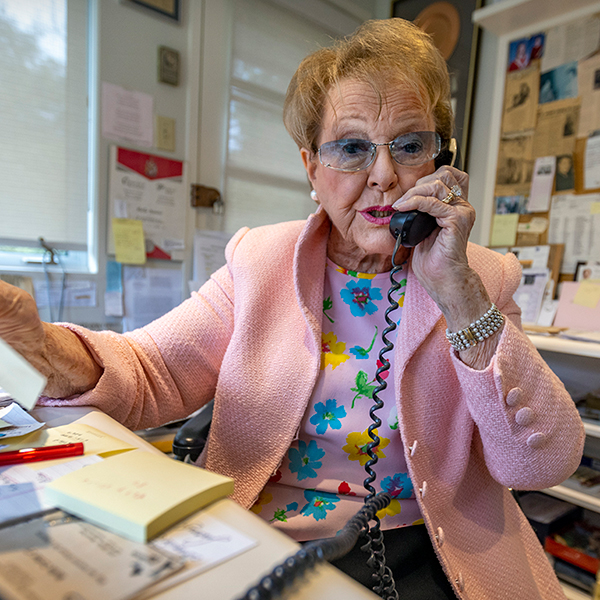When Andrew Schally, BSc’55, PhD’57, DSc’79, earned the Nobel Prize for Medicine in 1977, he quickly made it clear that he didn’t regard the award as an indication that his career had peaked in any way.
Schally, who had earned several other major scientific prizes at that point, including both the Lasker Award and the Gairdner Foundation International Award, submitted a biographical essay about his life for the Nobel website. “I do not feel that these prizes will have an adverse effect on my future productivity,” he wrote. “I am still as keen as ever to make new discoveries…”
He was true to his word. Schally has published more scientific papers since receiving the Nobel than he did before he won the prize — and he already had 1,000 publications to his credit by that point. Today, at the age of 94, he is still busy with research projects.
No one would have predicted his long and illustrious career in medical science during Schally’s boyhood.
“To tell you the truth, I was not especially focused toward science,” says Schally. “I was not scientifically minded.”
Schally was born in Wilno, Poland, and grew up in Warsaw. As a child in the 1920s, he was immersed in multiple languages and surrounded by his father’s military books. But he was more interested in swimming and soccer than scholarly learning. That would change, but first he and his family had to contend with very dangerous times.
When the Second World War began, Schally’s father left to fight with the Allies. The rest of the family fled to Romania. Living in a community of Polish and Jewish ex-pats, they survived the Nazi occupation of southeastern Europe.
Schally says he had exceptionally engaged teachers in Romania (and later in London and at McGill) who instilled in him a deep love of literature and broad knowledge of the world. Most importantly, perhaps, they awakened him to the wonders of science. While Schally spoke and read Polish, Romanian, Yiddish, and Italian, he was particularly drawn to books in French, his mother’s mother tongue. It was in Romania where a biography of one renowned French scientist made a life-changing impression on a 16-year-old Schally.
“The story of Louis Pasteur had a big influence on me,” Schally says.
Pasteur, a French biologist, pioneered research in microbiology, vaccinations and pasteurization. His life’s work saved millions of lives. Pasteur’s story revealed to Schally the power of science to improve the quality of human life.
After the war, Schally travelled through Italy and France, and studied in Scotland and England. With his facility for languages and the high-quality education he had received in Romania, Schally was able to land a junior position at the National Institute of Medical Research in London, where he says he was fortunate to find himself working alongside several future Nobel laureates. This group of exceptional scientists became colleagues, friends, and mentors for the young technician.
“They liked my interest in science, and the fact that I worked long hours,” says Schally. “Sometimes after lunchtime, other technicians would disappear and go for a drive. I always stayed overtime at noon and at night. I was simply an apprentice technician, but the British scientists liked me a lot and wanted me to stay. I carried on there and got a degree in chemistry.”
Being part of this community of scientists fuelled Schally’s ambitions to follow in the footsteps of Louis Pasteur and the National Institute researchers. He had developed a deep interest in how the hormonal system regulated growth, reproduction, health, and illness in people as well as animals.
In 1952, despite England feeling like a “paradise” to him, he began to look abroad for other opportunities to expand his education and experience.
The United States had become embroiled in the Korean War. Politically and personally, Schally wanted nothing to do with this — or any — new conflict.
“I knew that if I went to America, I would be drafted immediately,” he says. “But I wanted to see the world and felt I must gain more academic knowledge. I had to learn more about mammalian physiology.”
Schally found exactly what he was looking for in Canada.
“McGill was famous for physiology, chemistry, and especially for endocrinology,” he says. It was just what he was hoping for — a chance to simultaneously satisfy his wanderlust and his academic ambitions.
In May 1952, he boarded a boat in Southampton that carried him to Montreal where he would embark on the next chapter of his career. He once again found himself working among scientists, doctors and professors he admired, learning and expanding his research into the hormones that govern body functions in humans and animals.
At McGill, Schally collaborated with biochemist Murray Saffran on experimental therapeutics for disorders of the nervous and glandular systems. He became interested in how brain function affects endocrine activity — the behaviour of the glands that produce hormones in mammals.
By 1954, he had become intrigued by a part of the brain known as the hypothalamus.
He contributed to research that led to the discovery that the hypothalamus controls hormone production in the pituitary gland. The hormones the pituitary produces regulate production of other hormones elsewhere in the body.
This research on how the brain regulates body chemistry and function put Schally on the path towards his Nobel.
As part of the requirements for Schally’s doctorate at McGill, he had to pass tests in two languages other than English. He chose French and Italian. The French portion tested his knowledge and facility with a biography of a familiar figure: Louis Pasteur. Schally had great confidence in his performance on the exam.
“After the French examination, the dean called me in and said, ‘You got 98 in French. You have a permanent exemption in French.’ I asked him, ‘How did I lose two points?’”
Schally excelled at McGill, and found immense satisfaction in his work and his colleagues there.
“I owe everything I know in science to the people who trained me at McGill,” he says, “especially Professor David Thomson, the brilliant teacher in endocrinology from Abderdeen, Scotland, and Dr. Robert Cleghorn, the wonderful director of endocrine research where I worked.”
Montreal, though, turned out to be less than paradise, despite its initial promise.
“Canada is a beautiful country, and I was at home because I spoke French and English,” he says. “I arrived in May, so the weather was good. But I had problems with the Canadian climate in December.”
He says he came to Canada “armed” with surplus equipment from the British army and navy, including paratrooper boots and a seaman’s parka that was “like a super-blanket” that he wore over a Canadian overcoat with a thermal lining.
Still…
In 1957, he left Montreal for Houston, Texas, to continue his work at Baylor University College of Medicine. He became an American citizen in 1962, and carried on his research there, learning Spanish and Portuguese along the way, which allowed him to collaborate with scientists across Latin America.
Schally isolated and synthesized three hormones that are produced by the hypothalamus, revealing the mechanisms by which these hormones control other hormone-producing glands in the body. In 1977, Schally was rewarded for these insights when he was named a co-recipient of the Nobel Prize for Medicine.
Hormones are the body’s regulating system, carrying signals in the blood stream that control everything from when cells start and stop reproducing, to the production of sperm and eggs. Schally’s work has directly influenced treatments and medicines for fertility, immunology, and cancer. In fact, he developed some of those treatments himself, as part of his post-Nobel research.
“In 1984, I developed an improved treatment for prostate cancer,” he says. “I’m taking it now. I developed prostate cancer at 90, and I’ve been taking my medication for four years. It works very well in my case. I’ve been lucky to do practical work that has benefitted my own health.”
His work on hormone-dependent cancers has earned him further accolades. His contributions to developing life-saving therapies were cited by the French government in 2004 when it made Schally a Chevalier of the Legion d’honneur. Over the course of his career, Schally has received more than 30 honorary degrees.
Today, he holds the title of Distinguished Medical Research Scientist at the University of Miami’s Miller School of Medicine. His work for the past 28 years has centred around human growth hormone which regulates growth, cell reproduction, and cell regeneration. When these hormones are secreted in excessive amounts, it can lead to out-of-control cellular reproduction, and in the case of the male hormone testosterone, to the formation of malignant prostate tumours.
“When cancer is suspected, it involves abnormal growth, and we try to slow it down,” Schally says. “There’s still much to do here.”
Forty-three years after winning a Nobel Prize, Andrew Schally is still keen to make new discoveries.


